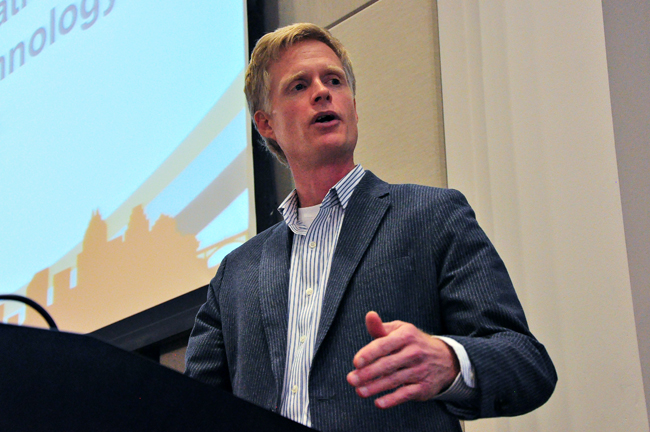Beginning in January, the University will double the amount of time students can watch Netflix on campus or study online.
The University is increasing its default bandwidth allocation, which all off-campus students are given as a part of their tuition fees, from 500 MB per week to 1 GB per week beginning Jan. 12. That is the equivalent of 600 web page views or three hours of Netflix — double the current amount — according to a University Information Technology Services network report. Students will still have the option to purchase additional bandwidth.
According to ITS, the new bandwidth policy will cost the University $215,000 a year. This increase follows an attempted policy change in August when ITS unsuccessfully tried to remove the default bandwidth allocation, which required students to purchase a bandwidth tier.
“In the end, the community came back and said they still desired to have some default allocation for academic use,” said William Green, ITS director of networking and telecommunications.
Bandwidth amounts for TAs will also be extended to a base of 50 GB, or 31,000 web-page visits per week. Other than doubling the default bandwidth amount, next semester the bandwidth system will be the same. Students will have the option to buy 10 GB, 50 GB, 200 GB or 500 GB of additional bandwidth for $3, $5, $6 or $8, respectively.
“I don’t think more Internet usage connection is ever a bad thing,” psychology sophomore Katy Giuffre said. “I don’t think it’s a big deal to have to pay for it, but I’m not going to complain if they want to give me more bandwidth for free.”
Green said students progressively needed more gigabytes of bandwidth for their academics, and that led to the switch to 1 GB of bandwidth. Green estimates about 80 percent of student Internet use is non-academic. Giuffre said she is usually studying online when she is on campus.
“It’s probably actually more academic,” Giuffre said. “Sometimes I’m on Pinterest or shopping if I have a little downtime. If I’m using my Internet connection on campus, it’s usually to study or submit papers or to find stuff on campus.”
According to the University ITS network report, at 50 percent academic use, about 85 percent of students do not exceed their bandwidth allocation. When increased to 1 GB, almost 95 percent of students are estimated to not exceed their bandwidth use.
The Internet will still be slowed if the 1 GB is exceeded, but Green said students can easily use Canvas and other academic sites.
“We think most basic needs are made when they exceed that bandwidth,” Green said. “Everyone has the option to purchase more bandwidth.”
Bandwidth use is not free and unlimited because of cost and liability concerns, Green said. Since bandwidth is a service funded by student fees and tuition through the central budget, Green said if use were free past 1 GB, then students would be paying for non-academic Internet use.
“Students consume different amounts of bandwidth depending on what they are doing,” Green said. “Not saying it’s right or it’s wrong — it may or may not be related to the mission. But do you really want students to be subsidizing somebody watching Netflix?”
Having students pay for bandwidth also protects the University from being held responsible for any illegal activity students do on campus since the students are paying for additional, non-academic bandwidth to accompany their 1 GB of academic bandwidth.
“They may just be watching calculus videos, but they may go hack something, or they may be distributing material that is copyrighted and owned by someone else,” Green said.
Also, allowing students to buy their own bandwidth prevents the need for the University to block non-academic websites.
“We as the University can let you do whatever you want to do, legally,” Green said.





















